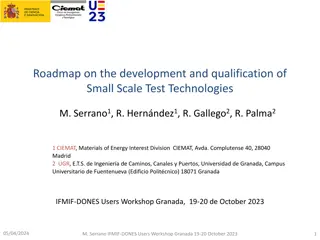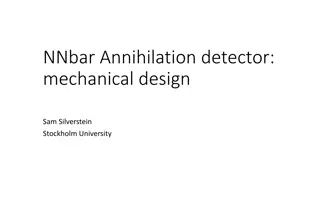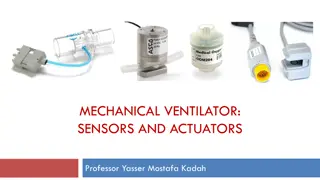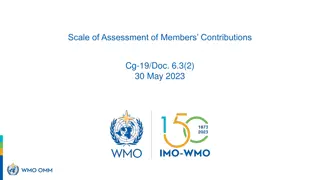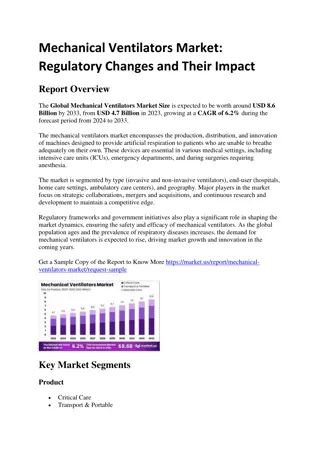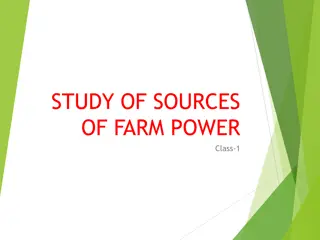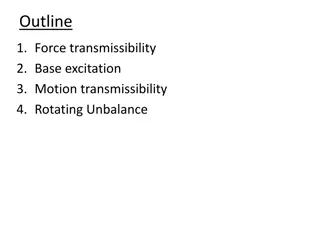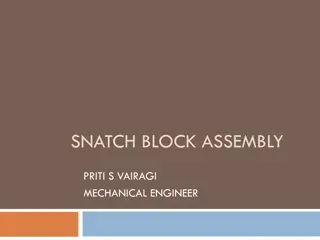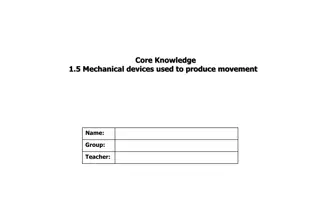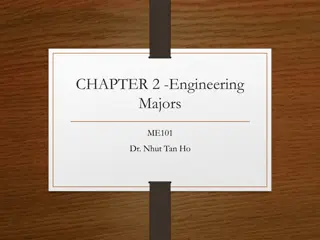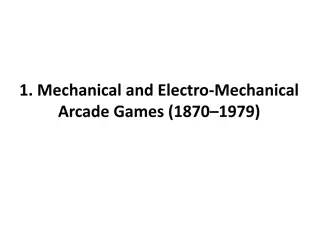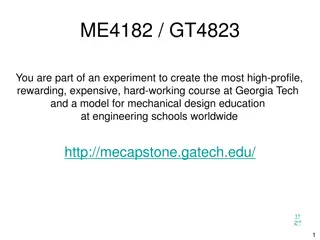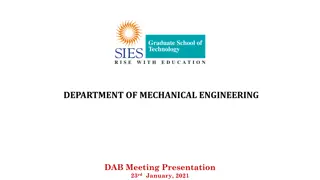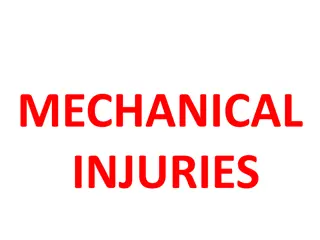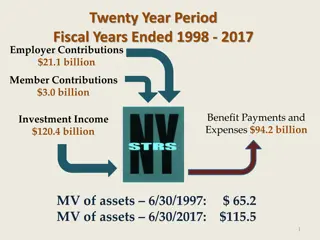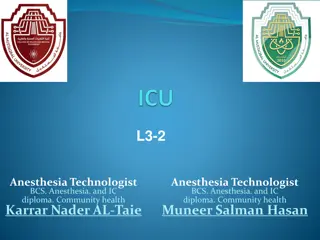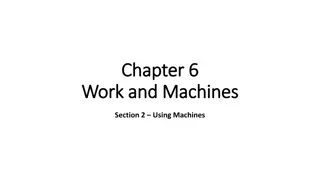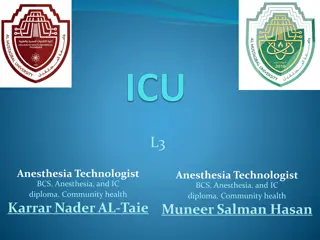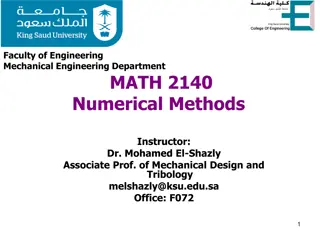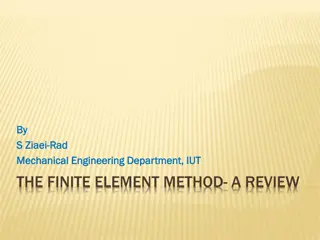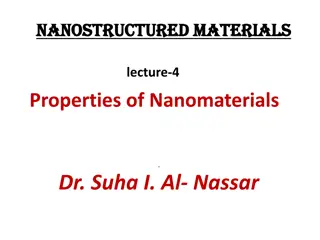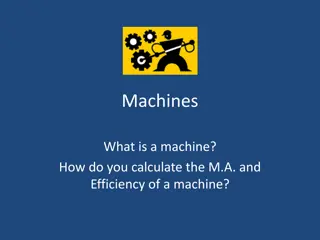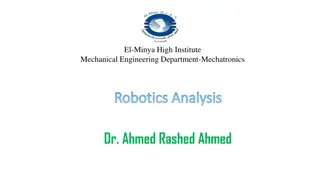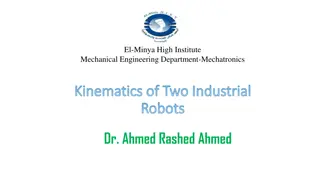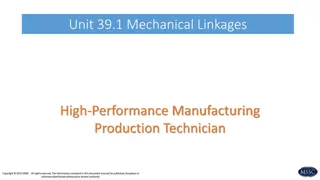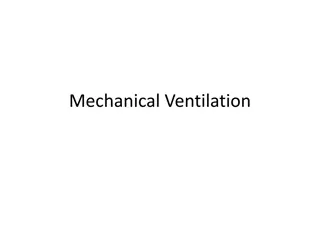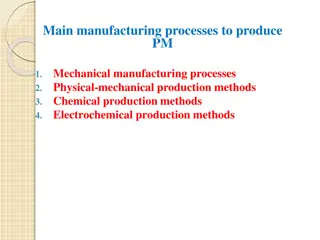Mechanical Engineering Curriculum Changes Fall 2024
The Mechanical Engineering curriculum is undergoing significant changes for Fall 2024, providing opportunities for students to adapt to a revised program. Changes include an improved design sequence, condensed math courses, and enhanced professional preparation with added elective options and a new
1 views • 12 slides
Overview of Mechanical Engineering Department and Institutes
Welcome to the Department of Mechanical Engineering! This presentation provides an overview of the department, highlighting key areas such as electromobility, institutes like FAPS and FMT, and their research and teaching focuses. Explore the interdisciplinary courses, research areas, and academic of
2 views • 13 slides
Development and Qualification of Small Scale Test Technologies in Structural Engineering
Small Scale Test Technologies (SSTT) play a crucial role in determining the mechanical properties of materials used in engineering applications. This roadmap focuses on the importance of testing relevant volumes to ensure transferability to real-world structures. It discusses the need for consistent
0 views • 26 slides
NNbar Annihilation Detector Mechanical Design Proposal
This proposal outlines the mechanical design considerations for the NNbar Annihilation Detector, highlighting practical concerns and proposed changes to the baseline design. Topics cover the structure support, component weights, installation challenges, and optimizations for improved detector perfor
2 views • 27 slides
Understanding Basic Forms of Energy
Energy exists in various forms such as light, heat, sound, electrical, chemical, and mechanical. These different forms of energy play a key role in causing changes in matter and enabling movement in various objects. From mechanical energy related to motion and position to chemical energy stored in m
4 views • 24 slides
Understanding Mechanical Ventilator Sensors and Actuators
Explore the essential components of mechanical ventilators, including sensors like pressure and flow sensors, actuators, and oxygen sensors. Learn about the functions and characteristics of these sensors and how they contribute to the operation of mechanical ventilators designed to assist patients w
6 views • 20 slides
WMO Scale of Assessment of Members' Contributions for 2024-2027 Period
The WMO scale of assessment for members' contributions is based on the latest United Nations scales approved by the General Assembly. The scales for the 2024-2027 period will be determined considering the UN scales from the 2021 and 2024 sessions. Adjustments for membership differences will be made,
4 views • 6 slides
Overview of Mechanical Ventilation in Critical Care
Discussing the indication, modes, variables, and controls of mechanical ventilation as well as the differences between volume and pressure control. Exploring assist control, synchronized intermittent mandatory ventilation, and other key aspects of ventilator management by Dr. Zia Arshad.
0 views • 22 slides
Piezoelectric Stack Actuator Market Analysis, Size, Share, Growth, Trends Foreca
The Global Piezoelectric Stack Actuator market stands at the forefront of technological driving advancements in various industries through its dynamic applications. These actuator systems harness the unique properties of piezoelectric materials, providing precision and versatility in a range of mech
0 views • 8 slides
Mechanical Ventilators Market: Future Prospects and Technological Innovations
The\u00a0Global Mechanical Ventilators Market Size\u00a0is expected to be worth around\u00a0USD 8.6 Billion\u00a0by 2033, from\u00a0USD 4.7 Billion\u00a0in 2023, growing at a\u00a0CAGR of 6.2%\u00a0during the forecast period from 2024 to 2033.
0 views • 4 slides
Overview of Farm Power Sources and Utilization in Agriculture
Farm power sources in agriculture include human, animal, mechanical, and renewable energy. Human power is costly but versatile, while animal power is traditional and provides manure. Mechanical power from tractors and engines is efficient. India's farm power sources reflect a mix of traditional and
0 views • 12 slides
Development of Settlement Geography: Contributions from Germany, France, and Others
Development of Settlement Geography has been influenced by major contributions from countries like Germany, France, and other European nations. German scholars like Carl Ritter and August Meitzen focused on house types and urban centers, while French geographers like Vidal de La Blache emphasized ru
0 views • 9 slides
Understanding Force Transmissibility in Mechanical Systems
Force transmissibility in mechanical systems is crucial for analyzing the relationship between applied forces and resulting vibrations. This outline covers key concepts such as base excitation, motion transmissibility, and rotating unbalance, providing insights into how forces are transmitted and am
0 views • 16 slides
Understanding Pulley Systems in Mechanical Engineering
Pulleys play a crucial role in mechanical engineering, offering fixed and movable designs that aid in changing the direction of hoisting appliances. Different types, including fixed, movable, and multiple pulley systems, provide mechanical advantage and stability in lifting loads. Utilizing multiple
1 views • 11 slides
Prescription and Arrear Contributions in Pension Law
Contributions are crucial for pension funds, with arrear contributions arising when payments are not made on time. Late payment interest applies to arrear contributions, prompting legal steps if ignored. Sanctions vary from termination to legal action, highlighting the importance of timely contribut
5 views • 12 slides
Understanding Mechanical Devices for Movement
Delve into the world of mechanical devices used to generate movement, focusing on levers as a critical mechanism for creating mechanical advantage. Learn about the different classes of levers, their applications, and how they enhance efficiency in various tools and equipment. Explore concepts such a
0 views • 8 slides
Introduction to Mechanical Engineering: Exploring Career Opportunities and Roles
This content delves into the world of mechanical engineering, covering topics such as the characteristics of students interested in engineering, the distinction between engineers and scientists, and the functions of engineers in research. It also provides insights into the differences between engine
6 views • 41 slides
Evolution of Arcade Games: From Mechanical to Digital (1870-1977)
Explore the fascinating journey of arcade games from mechanical and electro-mechanical devices in the 19th century to the birth of digital games in the mid-20th century. Witness the transition from coin-operated amusement machines to early digital arcade games and home consoles, shaping the gaming i
0 views • 37 slides
Residence Returning Scheme Points Allocation Guidelines
This document outlines the points allocation guidelines for the Residence Returning Scheme, covering categories such as Academic Excellence, University Contributions, Hall-Based Contributions, and Discipline Deduction. It provides detailed criteria for scoring in each category, including GPA points
0 views • 21 slides
ME 4182 & GT 4823: High-profile Mechanical Design Course at Georgia Tech
Spearheading an innovative experiment, ME 4182 & GT 4823 aim to redefine mechanical design education by fostering interdisciplinary collaboration, problem-solving skills, and real-world applications. Students engage in team-based projects to design mechanical solutions, present detailed specificatio
0 views • 36 slides
Department of Mechanical Engineering DAB Meeting Presentation Summary
The Department of Mechanical Engineering held a DAB Meeting Presentation on 23rd January, 2021. The meeting agenda included topics like approval of previous minutes of meeting, academic progress of students, online teaching activities, faculty contributions, and more. The minutes of the meeting disc
1 views • 36 slides
Understanding Mechanical Injuries: Types, Classification, and General Principles
Mechanical injuries encompass a variety of harms caused to the body, mind, reputation, or property. These injuries can be classified into medical, legal, and medico-legal categories based on factors like intentionality. The types of mechanical injuries range from blunt force trauma to thermal, chemi
0 views • 79 slides
ALSYOM: Key Player in High-Tech Industries
ALSYOM, a subsidiary of ALCEN Group, is a leading company specializing in high-technology activities across various domains including defense, security, energies, aeronautics, and more. With a strong focus on innovation and expertise in development and industrialization, ALSYOM stands out as a uniqu
0 views • 23 slides
NYSTRS Financial Performance Overview 1998-2017
NYSTRS experienced significant growth over a twenty-year period, with employer contributions totaling $21.1 billion, member contributions at $3.0 billion, benefit payments and expenses reaching $94.2 billion, and investment income amounting to $120.4 billion. The breakdown of income sources reveals
0 views • 5 slides
Understanding Mechanical Ventilation in Anesthesia Practice
Anesthesia technologists play a crucial role in managing artificial ventilation, including concepts like Invasive Positive Mechanical Ventilation (IPMV), Fraction of Inspired Oxygen (FIO2), Tidal Volume (VT), Peak Flow Rate, Respiratory Rate, Minute Volume (VE), I:E Ratio, and more. They monitor and
0 views • 27 slides
Returning Scheme and Criteria for Residence Recommendations
The Returning Scheme and Criteria for Residence Recommendations outline the key attributes, points allocation, and evaluation process for residents seeking to return to their hall. Points are awarded based on academic excellence, university contributions, hall-based activities, and discipline. The s
0 views • 20 slides
Understanding Machines: Making Work Easier and Mechanical Advantage
Machines are devices that simplify work by increasing force, decreasing force, increasing distance, or changing direction. They operate by transferring energy and work from input to output, with mechanical advantage enhancing force ratios. This summary explores the principles of machines, work done,
0 views • 10 slides
World War II Home Front Contributions and Impact
The chapter highlights the significant roles played by various groups during World War II on the home front. It covers topics such as the Selective Service Act, War Productions Board, women in the workforce, African Americans' contributions, Native American code talkers, Mexican-American involvement
0 views • 11 slides
Understanding Mechanical Ventilation in Anesthesia Technology
Mechanical ventilation plays a crucial role in assisting patients with breathing difficulties by delivering oxygen and removing carbon dioxide. It involves two primary types: Negative Pressure Ventilation (NPV) and Positive Pressure Ventilation (PPV). NPV helps patients with conditions like chronic
0 views • 19 slides
Newton's Interpolating Polynomials in Mechanical Engineering
Explore Newton's interpolating polynomials in the context of Mechanical Engineering, specifically focusing on numerical methods and interpolation techniques. Dr. Mohamed El-Shazly, an Associate Professor of Mechanical Design and Tribology, guides students through the concepts and applications of New
0 views • 17 slides
An Overview of Finite Element Method in Mechanical Engineering
Finite Element Method (FEM) in mechanical engineering is a powerful numerical technique involving dividing a domain into finite elements, establishing relations between variables, and assembling elements to analyze a system. This method is fundamental for solving one-dimensional problems and approxi
0 views • 63 slides
Understanding Mechanical Properties of Nanostructured Materials
Nanostructured materials exhibit unique mechanical properties due to factors like grain boundary structure and dislocation movement. Reduction in grain size can enhance strength and hardness while reducing ductility. Nanomaterials may reach theoretical strength levels, significantly higher than sing
0 views • 23 slides
Understanding Machines: Calculating Mechanical Advantage and Efficiency
In the world of machines, understanding what a machine is, how to calculate Mechanical Advantage (M.A.), and Efficiency is crucial. Machines alter force, distance, or direction to make work easier but do not multiply work. By assessing input force, distance, and work alongside output force, distance
0 views • 17 slides
Understanding Robotics: Components, Joints, and Manipulators in Mechanical Engineering
Explore the world of robotics through an in-depth analysis of the key components, mechanical elements, manipulator joints, end-effectors, and types of robots used in production engineering and mechanical design departments. Learn about joints, links, degrees of freedom, and how robot manipulators ar
0 views • 22 slides
The Case for Progressive Taxation: Ensuring Equality Through Fair Contributions
Progressive taxation involves higher tax rates for individuals with higher incomes or greater wealth, aiming to bridge economic and gender inequalities. This system can be achieved through well-designed tax scales, exemptions, and thresholds, ultimately contributing to fair distribution of contribut
0 views • 8 slides
Robotics and Mechanical Design at Minia University
Explore the world of robotics and mechanical design at Minia University's Production Engineering and Mechanical Design Department. From the Kinematics of Two Industrial Robots to the renowned PUMA 560, immerse yourself in cutting-edge technology and innovative research led by experts like Dr. Ahmed
0 views • 13 slides
Understanding Mechanical Linkages in High-Performance Manufacturing
Explore the world of mechanical linkages, including the effects of friction on machine operation, operation of machine linkages, and the roles of cams and turnbuckles. Friction is discussed as a force affecting everyday tasks, while cams and camshafts are highlighted for their role in sewing machine
0 views • 8 slides
Understanding Mechanical Ventilation in COPD Exacerbation
In a case of a 64-year-old woman with COPD exacerbation, managing respiratory distress is crucial. Initiating systemic corticosteroids, doxycycline, and nebulizers while closely monitoring the patient is important. However, in cases where non-invasive ventilation is ineffective, the patient may requ
0 views • 22 slides
Main Manufacturing Processes to Produce PM - Mechanical, Chemical, Electrochemical
The process of producing PM involves various manufacturing processes such as mechanical grinding and milling, physical-mechanical production methods, chemical production methods, and electrochemical production methods. Mechanical processes include grinding and milling using jaw crushers, hammer grin
0 views • 12 slides
Overview of Colleges of Education: Challenges and Contributions
This report explores the role of colleges of education in American education, highlighting their significant contributions through teaching, research, and service. It addresses issues such as diversity among educator candidates, enrollment declines, and faculty retirements, emphasizing the evolving
0 views • 30 slides


